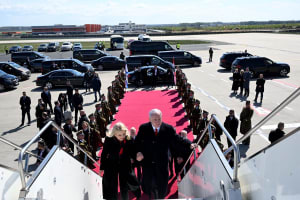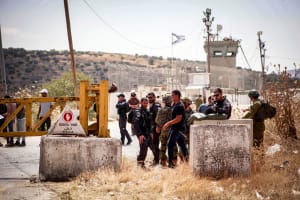Psychology expert believes Israeli strategy is to make Hamas fear the people of Gaza

Israeli clinical psychologist expert Dr. Ofer Grosbard believes that Israel is increasingly engaging in psychological warfare aimed at making Hamas members fear Gaza’s general population.
“You don’t need to mobilize divisions, and you don’t need to lose human lives – you need to understand the enemy,” Grosbard said in an interview with the Israeli news outlet Maariv.
"To this end, psychological warfare must be used,” he argued, lamenting that Israel has traditionally been slow on this war front due to a lack of understanding of the enemy mentality.
“However, in our security system, psychological warfare does not exist because a necessary condition for its existence is understanding the enemy's ways of thinking,” Grosbard explained.
By contrast, he emphasized that psychological warfare has long been a central component of Hamas and other terrorist organizations’ strategy in their ongoing war against Israel.
“The terrorist organizations have actually used psychological warfare against us throughout the years, which reached its peak in the issue of the hostages. They have what is called an 'external focus of control,' and therefore, they focus on us, learn, and get to know us. Whereas we, who have an 'internal focus of control,' focus on ourselves and do not know them," Grosbard assessed.
Throughout the war in Gaza, Hamas has released videos of Israeli hostages pleading for help. The videos serve as an effective propaganda tool aimed at creating divisions within Israeli society and increasing domestic pressure on the government to halt military operations against a weakened Hamas struggling to survive and regroup in Gaza.
During the recent ceasefire, Hamas staged hostage release events aimed at projecting the terror group's power and control in Gaza despite being severely weakened by Israeli military operations.
In addition, Hamas has used hostage release events to promote a false narrative that Israeli captives were treated well despite ample evidence of systematic torture and war crimes.
Israel is now responding by applying its own psychological warfare against Hamas operatives. Grosbard emphasized that its success depends on correctly understanding the traditional fear-driven mindset in Gaza and among the Arab population in Judea and Samaria, internationally known as the West Bank.
“The psychology of the residents of Gaza and the West Bank is that of a very traditional population... Therefore, some of its prominent characteristics are rumors, gossip, conspiracies, and, above all, fear. This is a culture in which independent thinking is less developed, group pressure is great, and people are driven mainly by fear. One can, of course, get the impression that the residents of Gaza will align themselves with Hamas as a result of fear,” he explained.
“These non-democratic societies have an external focus of control – that is, the emphasis is not on what I think and want, but on what the environment requires and forces me to do,” Grosbard continued.
The overarching goal of Israel’s psychological warfare strategy is to drive a wedge between Hamas and the general population in Gaza, increasing the sense of personal risk felt by Hamas operatives.
Grosbard drew a contrast between the mindset in Gaza and that of Western free societies.
“For example, a member of Western culture will automatically stop at a red light. If he does not do so, he may feel guilty. In contrast, in these (Palestinian) societies with an external focus of control, the individual may not stop at a red light if there is no policeman by his side. Order, therefore, is caused by fear – and not by internalizing values as in the West. Similarly, the individual will not steal in these societies because he may be caught – and not because it is ingrained in him that this is not the way to do things,” Grosbard said.
Looking ahead, he recommends that Israel focus on preventing anti-Israel incitement.
“Incitement is the driving force behind terrorism,” Grosbard assessed. “If we dry up incitement, there will be no terrorism. Today, using AI, it is not difficult to detect incitement content in various places and forms. To deny individuals and leaders the ability to incite as a result of punishment and fear is tantamount to denying their power.”
Grosbard stressed the importance of fostering an environment in Gaza and beyond where individuals are deterred from engaging in terrorism out of fear of the consequences.
“Creating a psychological situation in Gaza and the West Bank in which people will be afraid to engage in terrorism because someone will immediately report them and turn them in – this is the desired situation. The nature of their society, which is ruled by fear, must be understood, and these insights must be used. The goal is to create a situation in which Hamas members will fear the population that wants to be free from them – and not the other way around,” he explained.
“We are establishing a reward system where anyone who reports a Hamas member or any hostile activity is rewarded,” he continued. “Reports can be made discreetly via mobile phones. Anyone found guilty will be severely punished, as will anyone who knew and did not report. The carrots and sticks are simple: medical treatment and work in Israel – or their prevention.”
In addition to preventing incitement, Grosbard suggested creating group pressure against terrorism is paramount to the efficacy of the psychological warfare in Gaza. "Every time a Hamas member involved in terrorism is caught – his humiliating photo will be published and his family will be severely punished," Grosbard said.
He also stressed that humiliation could be a powerful tool in breaking the grip Hamas has over the Palestinian population. "The Palestinian population must shift from fearing Hamas – to a situation where every Hamas member fears being turned in," he explained.
Furthermore, Israel has made it clear that significant benefits would be offered to any Hamas member who releases a hostage. However, military pressure alone is unlikely to compel Hamas members to release captives. "They are prepared to fight us and die alongside the hostages – to preserve their honor in the eyes of their group," Grosbard stated.
The solution, he argued, lies not in military force but in psychological tactics that target the group's honor-based culture. "Damaging their honor and humiliating them in front of their peers – is the only way to change their behavior," he concluded.
This approach, he noted, is crucial not only for changing behavior but also for securing the release of hostages.
Last month, unverified video footage from Gaza appeared to show residents protesting against Hamas, blaming the group for the widespread destruction and calling for an end to the war. In response, Hamas – feeling increasingly threatened – has intensified its crackdown on protest leaders within the Strip.

The All Israel News Staff is a team of journalists in Israel.
You might also like to read this:
















